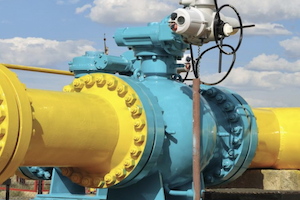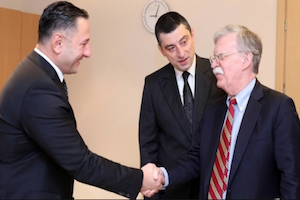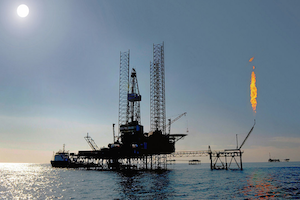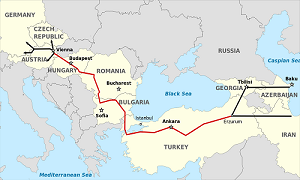First Azerbaijani Gas Reaches Albania Amid COVID-19
By Esmira Jafarova
July 14, 2020, the CACI Analyst
The first Azerbaijani gas via the Trans Adriatic Pipeline (TAP) reached Albania at the end of May 2020. This marked the first delivery of natural gas from Azerbaijan’s Shah-Deniz -II field in the Caspian Sea to Europe via the multimillion megaproject the Southern Gas Corridor (SGC). Despite the COVID-19 induced pandemics and global lockdowns, this is an important achievement testifying to the successful implementation of works in all four segments of the Southern Gas Corridor, including its final portion, TAP. The SGC is set to become fully operational in 2020 and it seems that Italy will also receive its earmarked portion of natural gas quite soon.

Bolton's Caucasian Tour and Russia's Reaction
By Eduard Abrahamyan
December 17, 2018, the CACI Analyst
On October 24-26, a U.S. State Department delegation headed by National Security Adviser Ambassador John Bolton visited the South Caucasian republics after talks in Moscow. The delegation’s visit to Azerbaijan, Armenia and Georgia was immediately dubbed a reinvigoration of U.S. policy towards the Caucasus and a pragmatic reengagement with the conflicted region. Bolton appeared to refine the evolving U.S. priorities with each country, categorizing them in accordance with political capabilities, shared interests and the roles that Georgia, Azerbaijan and Armenia respectively seek in relations with the West. The visit, however, caused an angry reaction from Moscow, especially given the issues Bolton raised in Yerevan.

Thinking Big About Caspian Energy
By Stephen Blank
November 29, 2018, the CACI Analyst
The signing of the Caspian convention in August 2018 has opened up exciting new possibilities for getting Central Asian oil and gas to European and global markets. The long-desired Southern Gas Corridor (SGC) from both shores of the Caspian has thus become a possibility. By thinking big, we can use Caspian gas for beneficial economic and political purposes. Whatever route Caspian energy takes to Europe, it must traverse the Caucasus and can be of substantial value in transforming the Eurasian geopolitical scene and agenda. Specifically, those parties who have the most to gain form resolving the Nagorno-Karabakh conflict can now devise a peace program that incorporates the use of energy to help foster an enduring peace between Armenia and Azerbaijan, reduce Russia’s ability to manipulate this conflict, and at the same time enrich them both as well as European consumers.

Russian Gas in the Southern Gas Corridor Could Undermine the EU’s Diversification Plans
By Ilgar Gurbanov
March 27, 2017, the CACI Analyst
Gazprom has officially declared its willingness to use the Trans-Adriatic Pipeline (TAP) as a route to deliver gas to Europe. TAP is an integral part of the Southern Gas Corridor (SGC) which is one of the priority energy projects for the EU to ensure the continent’s security of supply from a non-Russian source. Although technical and legal possibilities exist for Gazprom’s use of TAP’s expanded capacity, the long-term contracts securing the pipeline’s initial capacity for Azerbaijani gas together with EU legislation makes this option less likely. Nevertheless, the possibility of a Russian bid for TAP could hamper the EU’s diversification plans and block future gas supplies from other non-Shah-Deniz sources.

Is Washington re-engaging Baku?
By Stephen Blank
January 19th, 2016, The CACI Analyst
Throughout its tenure, the Obama Administration has minimized U.S. involvement with and engagement in both the Caucasus and Central Asia. However, a change in this policy may now be visible. Secretary of State John Kerry’s recent, and first, visit to Central Asia suggests a new interest in an expanded and hopefully regular mutual dialogue with the region. In the case of Azerbaijan, three high-ranking U.S. delegations have come through Baku in the last few months, clearly signifying renewed interest in dialogue and the subjects of their discussion, as revealed in the press, tend to corroborate that impression.




